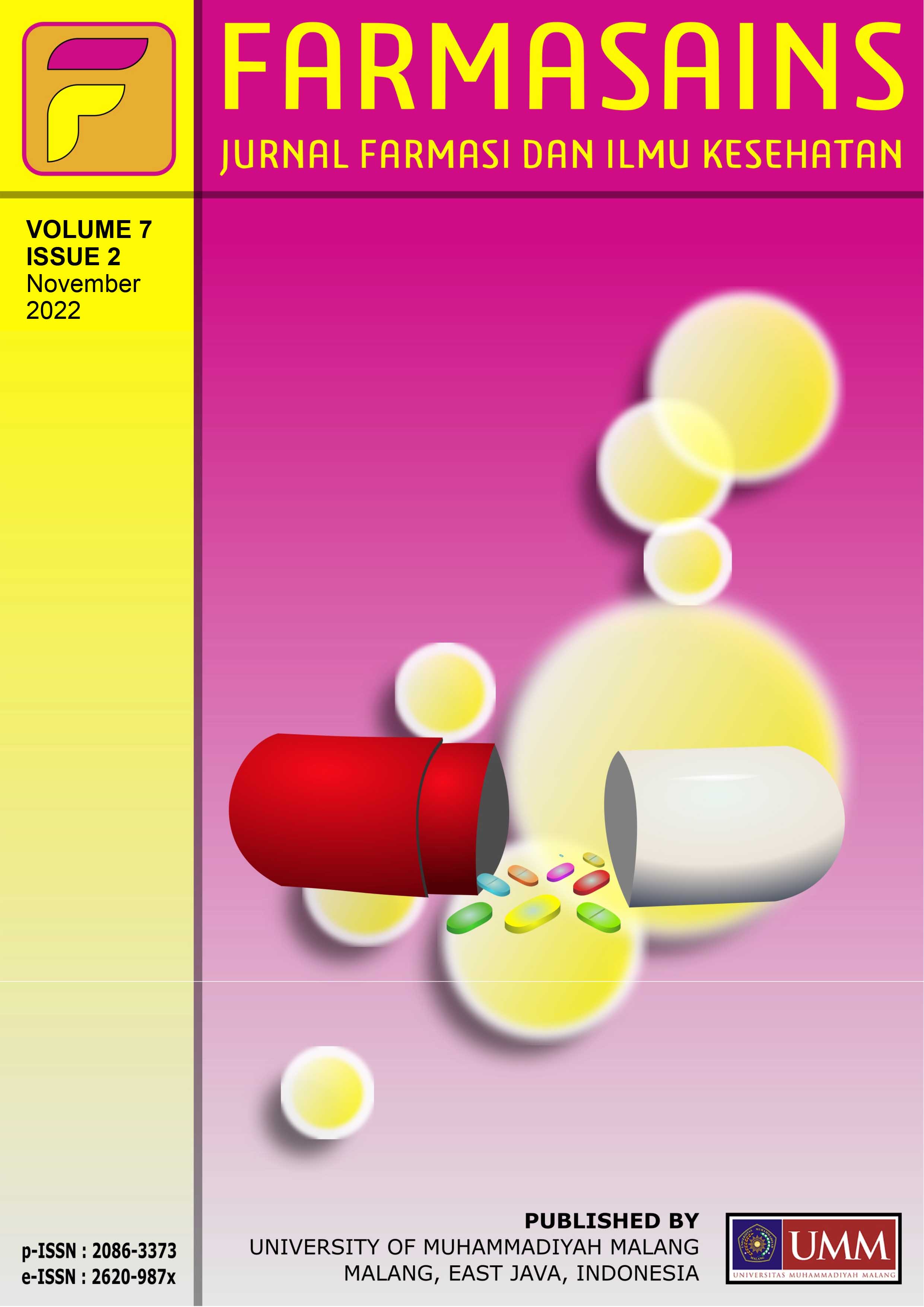Level of anxiety and internal tryout evaluation of the national objective structured clinical examinations (OSCE) results for pharmacy students
DOI:
https://doi.org/10.22219/farmasains.v7i2.35340Keywords:
OSCE, anxiety, pharmacy students, internal tryoutAbstract
OSCE (Objective Structured Clinical Examination) for pharmacist profession students is currently one of the measuring tools for success in competency exams to test victory in learning the Pharmacist Profession, in addition to the MCQ (Cognitive Based Test) method which is carried out in the form of CBT (Computer Based-Test). The Pharmacist Profession Study Program at the University of Muhammadiyah Malang (UMM) currently has professional pharmacist students and conducted a national tryout test for batch 2 students. In contrast, these students have never received training for the OSCE exam before. This study was conducted to evaluate the internal tryout on the results of the national OSCE score for Pharmacist students at the University of Muhammadiyah Malang” in batch 3 compared to batch 2, which had not done an internal tryout. In addition, an anxiety test was conducted on students taking the OSCE exam to get the degree of anxiety students taking the exam. From the study results, the anxiety level of the 2nd and 3rd batch students when facing the national OSCE exam was moderately anxious. Implementing the internal tryout had significant effects on the passing rate of the 3rd batch of students in the national OSCE exam.
Downloads
References
APTFI. (2013). Pendidikan Farmasi Program Studi Sarjana Farmasi & Profesi Apoteker. 1–47. http://www.aptfi.or.id/dokumen/2016-01-01 NA Kompetensi & Kur APTFI 2013.pdf
Ardinigtyas. B, Marchaban, Kusnanto H, F. A. (2017). 97282-ID-gambaran-pelaksanaan-praktek-kerja-profe. Jurnal Ilmiah Farmasi, 3(1), 19–26.
Bdair, I. A. A., Abuzaineh, H. F., & Burqan, H. M. R. (2019). Advantages and Disadvantages of the Objective Structured Clinical Examination OSCE in Nursing Education: A Literature Review. International Journal of Trend in Scientific Research and Development, Volume-3(Issue-2), 270–274. https://doi.org/10.31142/ijtsrd20269
Brannick, M. T., Erol-Korkmaz, H. T., & Prewett, M. (2011). A systematic review of the reliability of objective structured clinical examination scores. Medical Education, 45(12), 1181–1189. https://doi.org/10.1111/j.1365-2923.2011.04075.x
Fadhilah, M., Auda, R., Ardini, W., & Risahmawati, . (2015). Students’ perception on the effects of basic clinical skills training in preclinical phase to national OSCE. International Journal of Research Studies in Psychology, 4(4). https://doi.org/10.5861/ijrsp.2015.1226
Hadi, M. A., Ali, M., Haseeb, A., Mohamed, M. M. A., Elrggal, M. E., & Cheema, E. (2018). Impact of test anxiety on pharmacy students’ performance in Objective Structured Clinical Examination: a cross-sectional survey. International Journal of Pharmacy Practice, 26(2), 191–194. https://doi.org/10.1111/ijpp.12389
Hidayati, I. R., Fitrianidiah, L., & Pristianty, L. (2021). Influence of Family Support for Antipsychotic Treatment Adherence in Schizophrenic Patients Pengaruh Dukungan Keluarga Terhadap Kepatuhan Pengobatan Antipsikotik pada Pasien Skizofrenia. 18(01), 169–176.
Joshi, M. D., & Klausner, E. A. (2022). Course design, delivery, and assessment strategies for pharmaceutical calculations course in a doctor of pharmacy program: A review. Currents in Pharmacy Teaching and Learning, xxxx. https://doi.org/10.1016/j.cptl.2022.03.003
Kaya, E., Sari, İ., Tolukan, E., & Gülle, M. (2014). Examination of Trait Anxiety Levels of Physical Education and Sports Students (Ibrahim Cecen University Case). Procedia - Social and Behavioral Sciences, 152, 399–402. https://doi.org/10.1016/j.sbspro.2014.09.219
Martin, R. D., & Naziruddin, Z. (2020). Systematic review of student anxiety and performance during objective structured clinical examinations. Currents in Pharmacy Teaching and Learning, 12(12), 1491–1497. https://doi.org/10.1016/j.cptl.2020.07.007
Musyayadah, Z., Hidayati, I. R., & Atmadani, R. N. (2022). Hubungan Pengetahuan dan Sikap Wanita Usia Subur terhadap Pemakaian Alat Kontrasepsi Hormonal Suntik di Puskesmas Kecamatan Lowokwaru, Malang. Muhammadiyah Journal of Midwifery, 2(2), 58–68.
Pothireddy, N., Lavigne, J. E., Groman, A. S., & Carpenter, D. M. (2022). Developing and evaluating a module to teach suicide prevention communication skills to student pharmacists. Currents in Pharmacy Teaching and Learning, xxxx. https://doi.org/10.1016/j.cptl.2022.02.002
Quero Munoz, L., O’Byrne, C., Pugsley, J., & Austin, Z. (2005). Reliability, validity, and generalizability of an objective structured clinical examination (OSCE) for assessment of entry-to-practice in pharmacy. Pharmacy Education, 5(1), 33–43. https://doi.org/10.1080/15602210400025347
Spivey, C. A., Stallworth, S., Olivier, E., & Chisholm-Burns, M. A. (2020). Examination of the Relationship between Health-related Quality of Life and Academic Performance Among Student Pharmacists. Currents in Pharmacy Teaching & Learning, 12(11), 1304–1310. https://doi.org/10.1016/j.cptl.2020.04.032
UKAI, P. N. (2017). Blueprint Uji Kompetensi Apoteker Indonesia.
Downloads
Published
How to Cite
Issue
Section
License
Copyright (c) 2022 Engrid Juni Astuti, Ika Ratna Hidayati

This work is licensed under a Creative Commons Attribution 4.0 International License.
Authors who publish with this journal agree to the following terms:
a. Authors retain copyright and grant the journal right of first publication with the work simultaneously licensed under a Creative Commons Attribution License that allows others to share the work with an acknowledgement of the work's authorship and initial publication in this journal.
b. Authors are able to enter into separate, additional contractual arrangements for the non-exclusive distribution of the journal's published version of the work (e.g., post it to an institutional repository or publish it in a book), with an acknowledgement of its initial publication in this journal.
c. Authors are permitted and encouraged to post their work online (e.g., in institutional repositories or on their website) prior to and during the submission process, as it can lead to productive exchanges, as well as earlier and greater citation of published work (See The Effect of Open Access).













